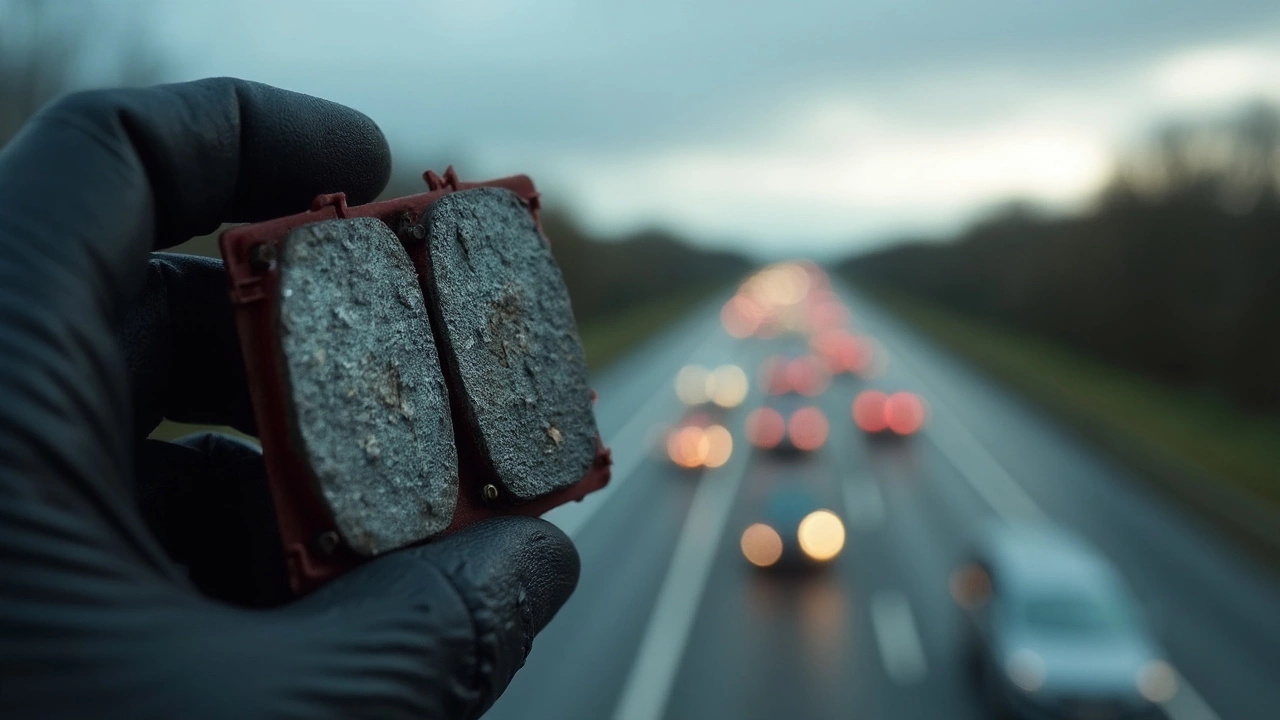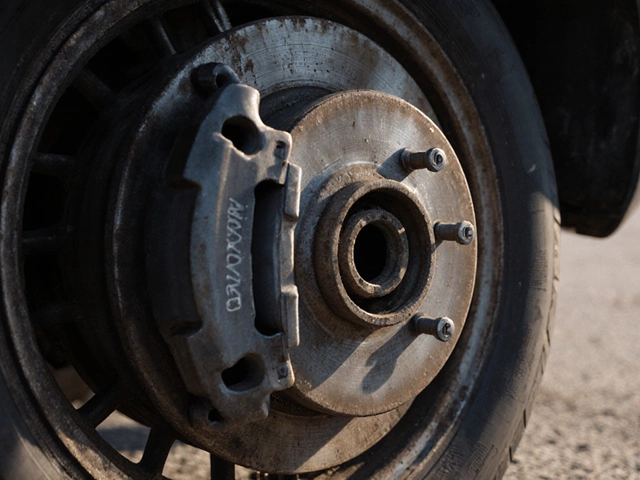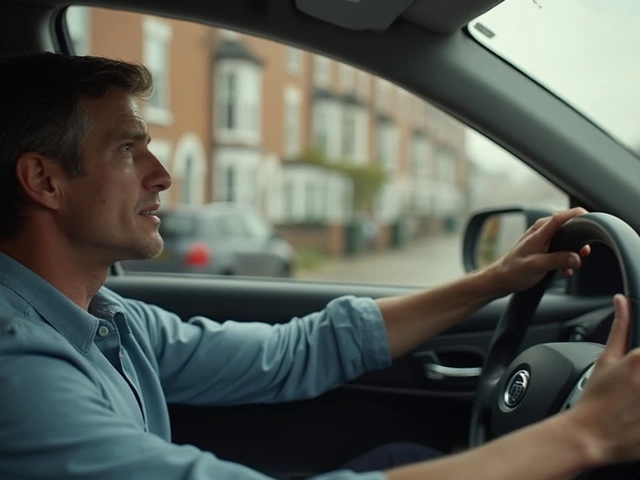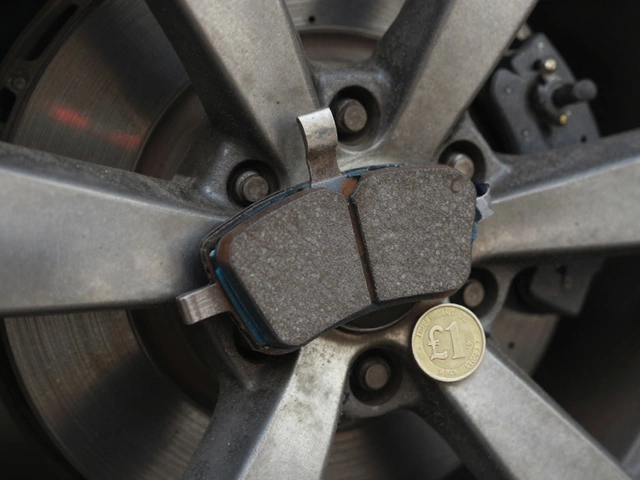Picture this: you’re cruising down the road, windows down, music up, when your brake pedal suddenly greets you with a harsh, metal-on-metal scream with every stop. That grinding sound is a siren you can’t ignore—like your car shouting, "Hey, I need help!" If you’re tempted to just power through and figure you’ll deal with it later, well, I’ve got some stuff you really need to know before you decide to roll those dice.
What Causes Brakes to Grind and Why It Matters
If brakes make noise, they’re probably trying to tell you something. That sharp, grinding sound usually means something’s gone way past the normal wear-and-tear stage. Most of the time, it’s because the brake pads—those little slabs that squeeze the shiny disc (rotor) to slow you down—have worn down to the metal. Imagine jogging barefoot on concrete. Doesn’t take long before it hurts, right? Same deal here: when those brake pads vanish, all that’s left is metal-on-metal contact. Your car will still stop, but it’ll sound awful and chew up other parts.
Other reasons can be just as problematic. Sometimes, a rock or bit of road junk gets jammed between the rotor and pad, grinding until it’s spat out. Or maybe you have a stuck caliper—basically the part that pushes the pad onto the rotor—that’s refusing to let go, causing real friction. Moisture or rust on the rotor can cause a low-grade grind that might go away after a few stops. But if that sound keeps coming back...yeah, don’t ignore it.
When it comes to brakes, things can go downhill fast. Here’s why: Those pads aren’t made to last forever. According to the Car Care Council, most people should check brake pads every 15,000–20,000 miles. Wait too long and you’re not just hearing noise—you’re looking at ruined rotors, busted calipers, and much more expensive repairs. Even scarier? You might find your brakes start fading under stress, making it harder—or even impossible—to stop in a hurry.
Here’s a quick look at common grinding brake causes and what they usually mean for you:
| Common Cause | What It Means |
|---|---|
| Worn-out brake pads | Direct metal-to-metal contact, rapid rotor wear |
| Debris stuck in brakes | Grinding can sometimes disappear once debris clears, but not always |
| Bad calipers | Pad doesn’t release, leading to hot, noisy brakes and more damage |
| Rust or moisture | Temporary grinding that can fade, but repeated rust means pads may stick or seize |
The Hidden Dangers of Driving with Grinding Brakes
No matter how tough you think your car is, driving on grinding brakes means you’re rolling the dice with your safety (and the cost of future repairs). Let’s be blunt: it’s not safe. There’s no sugarcoating it. The National Highway Traffic Safety Administration (NHTSA) found that about 25% of vehicle accidents linked to mechanical failure are because of faulty brakes.
Here’s what’s really at risk when you keep driving through that horrible noise:
- Reduced stopping power: Without those pads, it takes longer to stop—sometimes, a lot longer—especially if you’re hauling kids, groceries, or towing something.
- More damage: Dig deep enough into the rotor and you’ll soon be paying for a new one, along with pad replacements and maybe even new calipers. Fixing $80 pads is way cheaper than an $800 brake job.
- Total brake failure: In rare cases, the friction can be so extreme that a rotor can crack or the hydraulic system can lose pressure, leading to a “pedal to the floor” moment (which, trust me, is not a fun experience).
- Risk to others: Brake issues make your car unpredictable. You’re not just putting your life at risk, but other drivers, cyclists, and pedestrians too.
- Insurance headaches: If a crash is traced back to ignored brake noise, some insurance companies might give you a hard time covering damages.
There’s also the law to think about. Some states can fail your car during regular inspections if they catch bad brakes. In California, for instance, police can impound vehicles considered unsafe. And if you cause a wreck, you could face legal trouble for negligence. Risk just isn’t worth it.
One thing people don’t always realize: modern anti-lock brakes (ABS) can make some problems even worse. If the sensors pick up super-damaged rotors, you could get dash warning lights or the system could fail to work correctly. Suddenly, that “safety net” you count on is gone.
Plus, any money you think you’re saving by “just waiting a little longer” usually gets eaten up—and then some—by towing, labor, expensive new parts, or even dealing with lawsuit fallout if something bad happens.

Warning Signs You Shouldn’t Ignore
Grinding brakes might sound like the biggest warning, but your car often whispers before it screams. You want to catch issues way before you get to full-on grinding. Here’s how you know when to raise the alarm:
- Squealing or squeaking when braking. Most brake pads have tiny metal tabs that squeal as a built-in warning sound so you know they’re getting thin.
- Vibration or pulsing in the brake pedal. This might mean your rotors are warped or uneven—often a sign of worn pads or overheated brakes.
- Brake warning light. If you see a red or yellow warning, grab your manual and take it seriously. Some warning lights even measure pad thickness!
- Needing to press down harder than usual to stop. Faded brakes are bad news, especially in emergencies or on wet or downhill roads.
- Visible scoring or grooves on the rotor. If you peek through the wheel and see deep lines, you’re past normal wear.
- Strange feelings underfoot, like a spongy or “long” pedal. Air or moisture might be in your hydraulic lines—a big safety risk.
Here’s an easy way to spot trouble: If your brakes are making new noises, changing how they feel, or acting up only when hot or cold, something’s wrong. Don’t gamble. Mechanics say plenty of drivers ignore squeaks and end up stranded by the side of the road—often with their wallet $1,000 lighter than if they’d acted sooner.
If you’re not sure, trust your nose, too. Burnt-smelling brakes (think acrid, electrical-smelling smoke) are a sure sign of a stuck pad, worn-out part, or failing caliper.
Instead of guessing, do a quick “brake check” every month. Here’s what to look for:
- Listen as you brake in parking lots or at low speeds. Squeals, squeaks, or grinds? Not normal.
- Check your dash for any new warning lights.
- If you feel vibrations, note when they start—at speed, during stops, or while braking.
- Look at your wheels for black dust or metal flakes—often signs that pads are wearing unevenly.
If you spot any of these signs, don’t mess around: it’s time to get it checked.
Smart Moves: What To Do Next (and How to Prevent More Problems)
That grinding brake noise is not just an annoyance; it’s your car’s last cry for help before things get ugly and expensive. So, what should you actually do (besides crossing your fingers)? Here’s a playbook for handling this mess without losing your mind—or blowing your budget.
- Ease off on driving. If you hear a grinding noise, stop using the car unless you absolutely have to. Short, slow, close-to-home drives are less risky, but don’t put off a fix.
- Call a pro mechanic—quick. The sooner you get a real diagnosis, the less you’ll pay down the line. A good shop will do a test drive, inspect pads and rotors, and spot stuck parts or hydraulic leaks in under an hour.
- Don’t DIY unless you know your stuff. It’s fine to look at your brakes, but swapping pads or diagnosing odd caliper issues can go sideways for amateurs. There’s a ton of crucial safety stuff hiding behind each wheel.
- Save money with regular checks. According to AAA, getting brakes checked at every oil change (or at least twice a year if you drive less) can triple the life of your rotors and slash the risk of serious failure.
- Invest in quality parts. Cheap pads or rotors wear out fast and don’t always stop as well in emergencies. Ask for OEM-quality kits or parts if you’re not sure what’s best.
Here’s something you might not realize: most direct brake repairs average $150–$300 per axle if you catch things early. Wait too long, and a full rotor/pad/caliper job can land at $900 or higher. In rare cases, if the damage ruins the master cylinder or lines (due to debris or heat), repairs crank up even more.
Want to stretch the life of your brakes? Try these tips:
- Don’t “ride” the brakes—coast more when possible.
- Keep your load lighter; the heavier the car, the harder brakes have to work.
- Change brake fluid as recommended (usually every 2–3 years, check your manual).
- Pay attention if you live in snowy, rainy, or mountain areas; you’ll wear pads faster.
- Get small problems fixed before they become big ones. Think of pads like shoes: catch a hole early and you won’t need a whole new pair of boots.
Rare but worth repeating: if your brakes suddenly go to the floor or make a weird noise, don’t tough it out. Pull over somewhere safe, use your hazard lights, and call for a tow. Modern roadside assistance is just a click away and saves you the headache (and cost) of a crash or total breakdown.
So, is it safe to drive on grinding brakes? The short answer is no. Grinding brakes are a warning—one that almost never solves itself. Pay attention, act quickly, and you’ll keep yourself, your passengers, and everyone else on the road that much safer.


